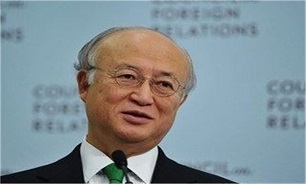Iran Subject to Most Robust Nuclear Verification Regime
 "Two years ago, the IAEA played an important part in
bringing about a landmark international agreement concerning Iran’s nuclear
program, known as the Joint Comprehensive Plan of Action,” Amano said recently
during the Bled Strategic Forum, in Bled, Slovenia, the official website of the
IAEA reported.
"Two years ago, the IAEA played an important part in
bringing about a landmark international agreement concerning Iran’s nuclear
program, known as the Joint Comprehensive Plan of Action,” Amano said recently
during the Bled Strategic Forum, in Bled, Slovenia, the official website of the
IAEA reported.
He added, "The Agency is now verifying and monitoring Iran’s implementation of its nuclear-related commitments under that agreement, acting as the eyes and ears of the international community”.
"The JCPOA represents a clear gain for nuclear verification. Iran is subject to the world’s most robust nuclear verification regime. Our inspectors are on the ground 24/7. We monitor nuclear facilities, using permanently installed cameras and other equipment.”
Iran accepted many restrictions on its nuclear program, which is now smaller than it used to be, the head of the nuclear watchdog said, adding, "The IAEA has expanded access to sites and information.”
"The Iran case demonstrates that even complex and challenging issues can be tackled effectively if all parties are committed to dialogue – not dialogue for its own sake, but dialogue aimed at achieving results…The IAEA was able to make a vital contribution, and maintain the confidence of all sides, by sticking to its technical mandate and not straying into politics.”
Iran and the Group 5+1 (Russia, China, the US, Britain, France and Germany) reached the 159-page nuclear agreement in July 2015 and implemented it in January 2016.
US President Donald Trump has called the agreement "the worst deal ever” and repeatedly threatened to scrap it.
Since the historic deal was signed in Vienna, the IAEA has repeatedly confirmed the Islamic Republic’s compliance with its commitments under the JCPOA, but some other parties, especially the US, have failed to live up to their undertakings.
